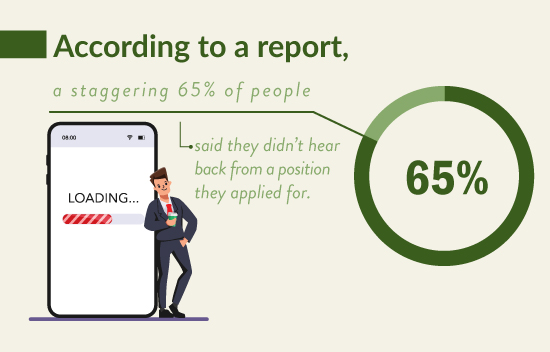While the term ‘ghosting’ is rooted in the modern dating world, it has woven its way into the recruiting landscape.
Recruiters are inundated with a lot of tasks and find it quite difficult to handle the high volume of applications that come through. On the other hand, job seekers expect recruiters to keep them updated throughout the application process. Besides, after pre-employment tests and multiple rounds of interviews with hiring professionals, candidates need closure so they can get back on their job-hunting bandwagon if they are being rejected. It can be quite discouraging to be hit by silence after all the effort.
But it looks like the etiquette of sending a rejection letter has lost its way. 75 percent of applicants never hear back from employers after applying for a job, and sixty percent never hear back from employers after an interview.
A great number of hiring managers only focus on onboarding the successful candidates and leave the rest to draw their own conclusions. But let’s not forget, a trawl through the Glassdoor website indicates that ghosting job candidates could tarnish you company brand’s reputation.

Candidate Ghosting Worsens During the COVID-19 Pandemic
Many disgruntled job seekers complain that their follow-up emails are ignored by the Human Resources team, leaving them to suffer in silence. In fact, job positions that recruiters were actively trying to fill initially are no longer available due to company-wide freezes on recruitment after the COVID-19 pandemic.
Indeed found that a whopping 77% of job seekers say they’ve been ghosted by a prospective employer since the onset of the pandemic, with 10% reporting that an employer has ghosted them even after a verbal job offer was presented to them.
A survey by CareerBuilder revealed that 42% of workers said they would never seek employment with the company again if they were displeased with the way their application was handled and another twenty two per cent said they would tell others not to work there.
So what’s the lesson for hiring professionals? Don’ t disregard the power of strong candidate communication and the business impact of a little courtesy.

The Perils of Ghosting Job Candidates
- Risk Losing Customers
Customer experience is paramount, and it only takes one negative experience to turn a lifelong customer into a lost customer. Even when a particular job seeker may be unfit for your organization, they may be a patron of your business.
In a study, 32% of job seekers reported they are less likely to purchase a product from a company that didn’t respond to their job application. Recruiters should remember that they represent their brand every time they interact with someone on behalf of their organization.
Whether you hire an individual or not, providing a positive candidate experience can help ensure that your applicants remain loyal customers.
- Harm Your Company’s Reputation
Word gets out and people talk. They not only talk about your organizational brand but also about your employer brand. However, your talent pipeline is likely to shrink once the word spreads in the marketplace about your company ghosting applicants– whether verbally or online. According to a study, twenty two percent of job seekers said they would tell others not to work for an unresponsive organization.
Candidates’ experience of a difficult or unsatisfactory hiring process dissuades potential candidates from working for your company. Since job candidates tend to post negative reviews online of your business on various social media networks, your company’s reputation as an employer of choice is severely damaged after ghosting job candidates.
- Make Marginalized Job Seekers Even More Invisible
Applicants from low-income background or a racial minority may already feel like they are unnoticed. In such a situation where a person is struggling with low self-esteem, it takes a lot of courage to fill out a job application and put themselves out there for employment.
For the marginalized job seekers, landing a high-paying job is a way to feel valued. When you ghost 90% of your applicant pool, your company perpetuates the idea that these individuals don’t matter.
Communicating with job seekers during all the phases of the hiring process is necessary to keep the momentum of your recruitment marketing strategy. In a nutshell, ghosting job candidates doesn’t only narrow down your talent pipeline but also hurts your employer brand.
